A Study of the Relationship between Research Output and National Productivity Development in the Mekong Region
Main Article Content
Abstract
Enhancement of productivity is crucial for national development in the Mekong region (China, Thailand, Cambodia, Laos, Myanmar, and Vietnam). This study aims to investigate potential positive relationships between research output and national productivity. Research output consists of the number of documents, citable documents, citations, self-citations, and citations per document. A correlation analysis was conducted using meta data from the World Bank and SCImago covering the period from 1996 to 2021. The findings reveal that the number of published documents has the strongest positive correlation with national productivity in all countries. The number of documents and citable documents are positively related in 99 percent of the six countries, reflecting a shared effort to generate citable documents. Self-citations show a stronger positive relationship with national productivity than external citations, although both are less influential than the number of documents and citable documents. Linear regression analysis further indicates that the number of published documents is the primary driver of national productivity, with an adjusted R-squared value of 55% at a 95% confidence interval. The study suggests that governments in the Mekong region should encourage researchers to publish a sufficient quantity and quality of research papers. Additionally, they should support research institutes and universities in developing their own Scopus-indexed journals to facilitate knowledge exchange. By increasing knowledge in the region, long-term national productivity can be significantly enhanced.
Article Details

This work is licensed under a Creative Commons Attribution-NonCommercial-NoDerivatives 4.0 International License.
References
Ab Rahim, I. S., Yaacob, A., Abd Aziz, N. H., Abd Rashid, S., and Desa, H. (2013). Research publication output by academicians in public and private universities in Malaysia. International Journal of Higher Education, 2(1), 84-90.
Becerra-Fernandez, I., and Sabherwal, R. (2014). Knowledge management: Systems and processes. New York: Routledge. doi: 10.4324/9781315715117
Hana, U. (2013). Competitive advantage achievement through innovation and knowledge. Journal of Competitiveness, 5(1), 82-96.
Hasan, I., Kobeissi, N., Liu, L., and Wang, H. (2018). Corporate social responsibility and firm financial performance: The mediating role of productivity. Journal of Business Ethics, 149(3), 671-688.
Kardashevskii, V. and Shestakova, G. (2000). A rise in the standard of living can be achieved only through productivity. Problems of Economic Transition, 43(8), 92-96.
Lovakov, A., Panova, A., and Yudkevich, M. (2022). Global visibility of nationally published research output: The case of the post-Soviet region. Scientometrics, 1-17.
Lynch, T. D. and Nyhan, R. C. (2001). A holistic approach to productivity. In Handbook of public quality management. (pp. 171-178). New York: Routledge.
Mañana-Rodríguez, J. (2015). A critical review of SCImago journal & country rank. Research Evaluation, 24(4), 343-354.
Masayoshi, S., Kiyoshi, W., and Kazuo, N. (1991). Value added productivity. Tokyo: Asian Productivity Organization.
Mohapatra, S., Agrawal, A., and Satpathy, A. (2016). Knowledge management cycles. In Designing knowledge management-enabled business strategies. (pp. 13-29). Switzerland: Springer Cham.
Pandey, P. and Pandey, M. M. (2015). Research methodology tools and techniques. Romania: Bridge Center.
Pastuszak, Z., Helo, P., Lee, T. R., Anussornnitisarn, P., Comepa, N., and Fankham-Ai, K. (2013). Productivity growth: Importance of learning, intellectual capital, and knowledge workers. International Journal of Innovation and Learning, 14(1), 102-119.
Phusavat, K., Comepa, N., Sitko-Lutek, A., and Ooi, K. B. (2011). Interrelationships between intellectual capital and performance: Empirical examination. Industrial Management & Data Systems, 111(6), 810-829.
Phusavat, K., Comepa, N., Sitko-Lutek, A., and Ooi, K. B. (2012). Intellectual capital: National implications for industrial competitiveness. Industrial Management & Data Systems, 112(6), 866-890.
Singh, H., Motwani, J., and Kumar, A. (2000). A review and analysis of the state-of-the-art research on productivity measurement. Industrial Management and Data Systems, 100, 234-241. https://doi.org/10.1108/02635570010335271
Singh, Y. K. (2006). Fundamentals of research methodology and statistics. New Delhi: New Age International (P).
Turban, E. (2011). Decision support and business intelligence systems. Pearson Education India.
Williams, P. J. (2007). Valid knowledge: The economy and the academy. Higher Education, 54(4), 511-523. http://www.jstor.org/stable/29735128
Websites
SCImago. (2022). SJR-SCImago Journal & Country Rank [Portal]. Retrieved September 15, 2022, from http://www.scimagojr.com
The World Bank. (2022). World Bank national accounts data, and OECD National Accounts data files. Retrieved July 20, 2022 from https://data.worldbank.org/indicator/NY.GNP.MKTP.CD


